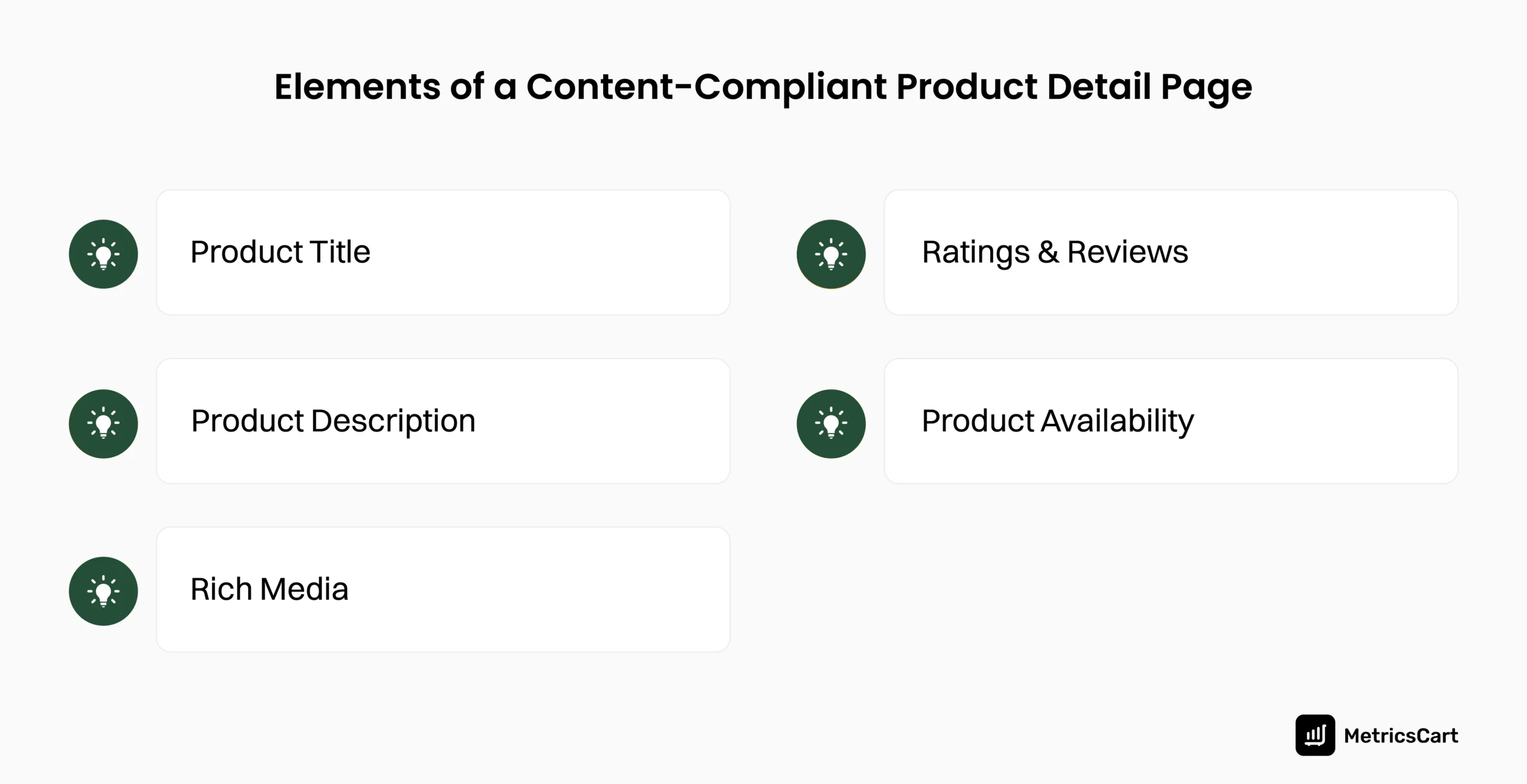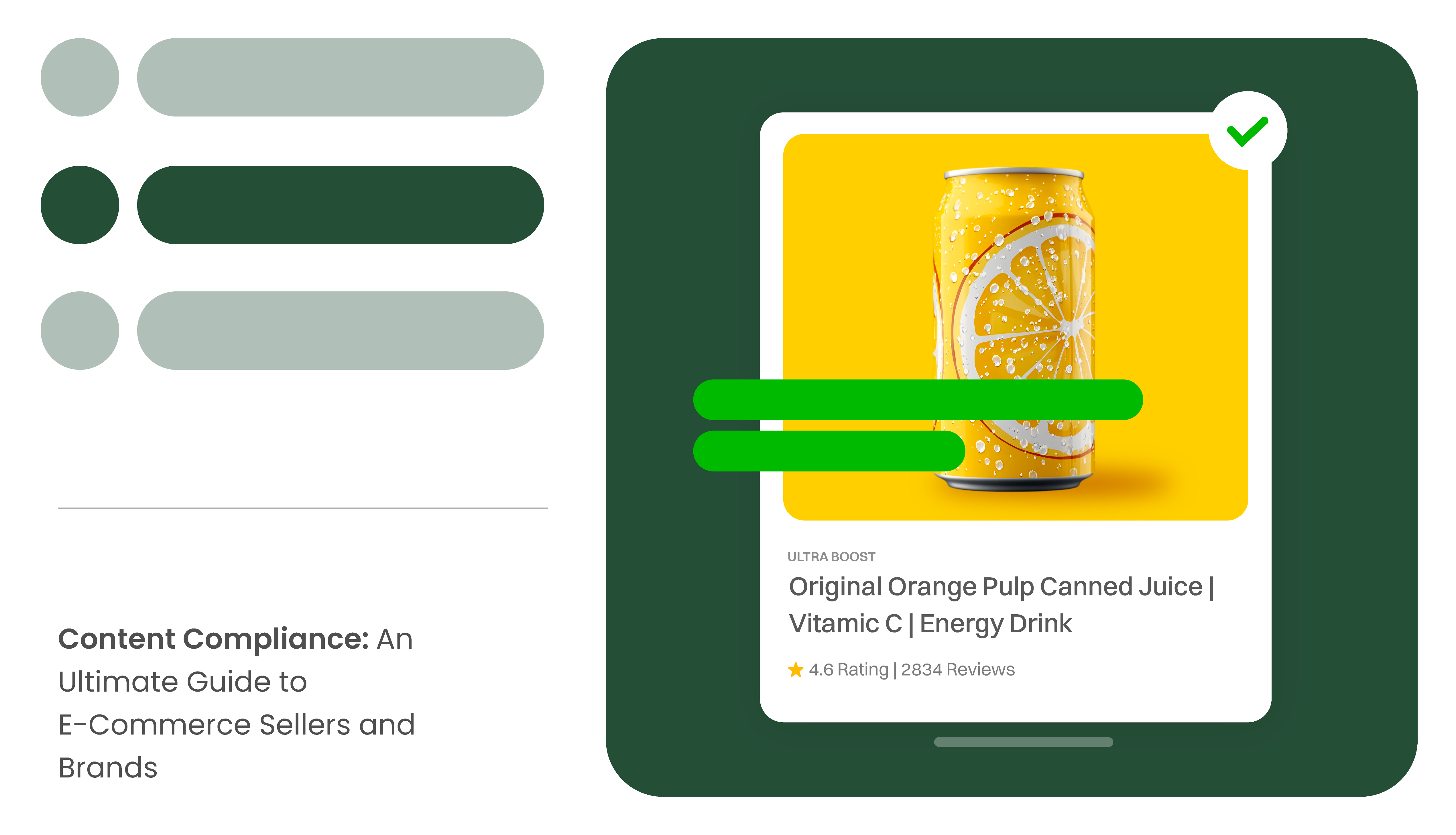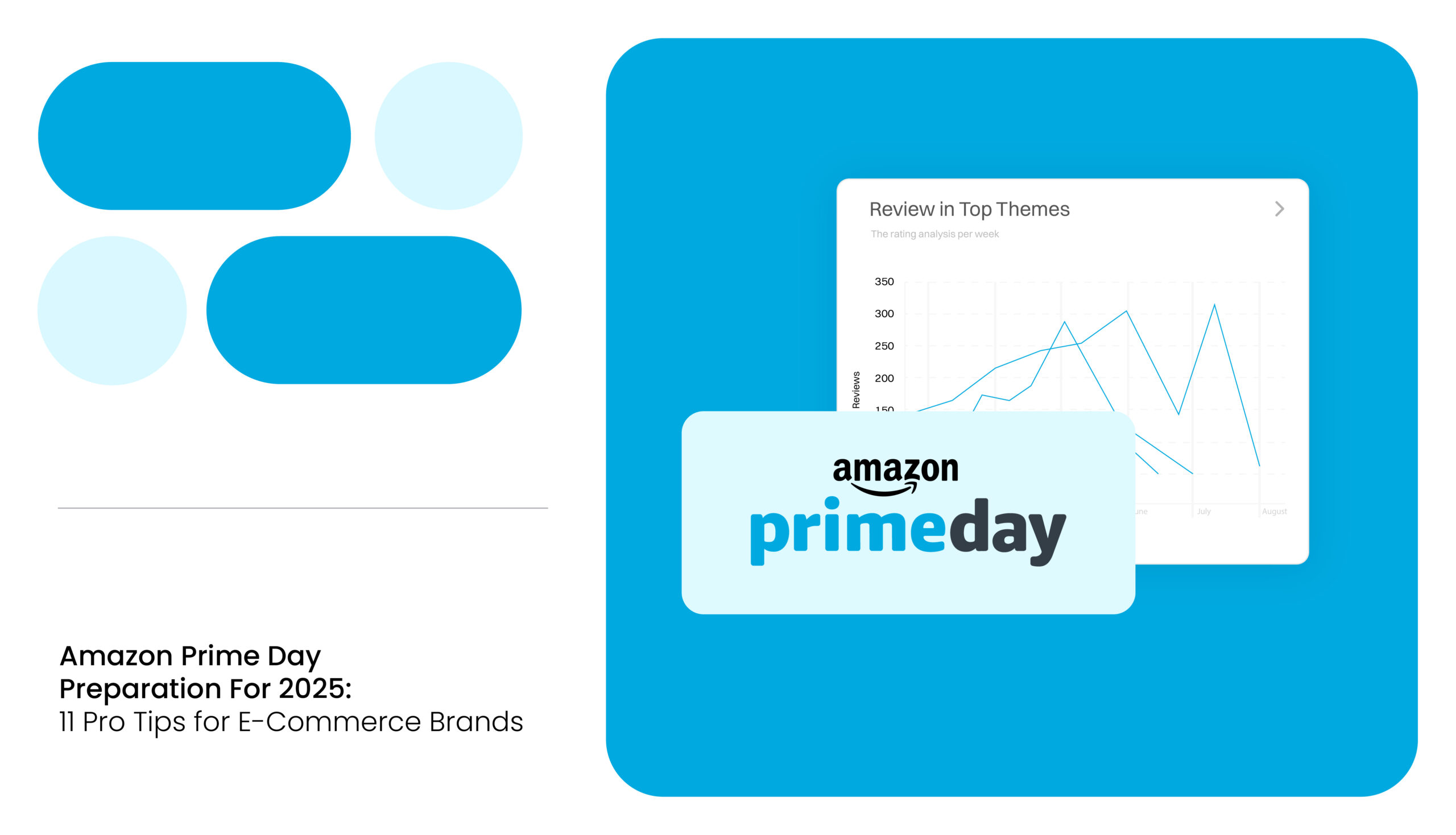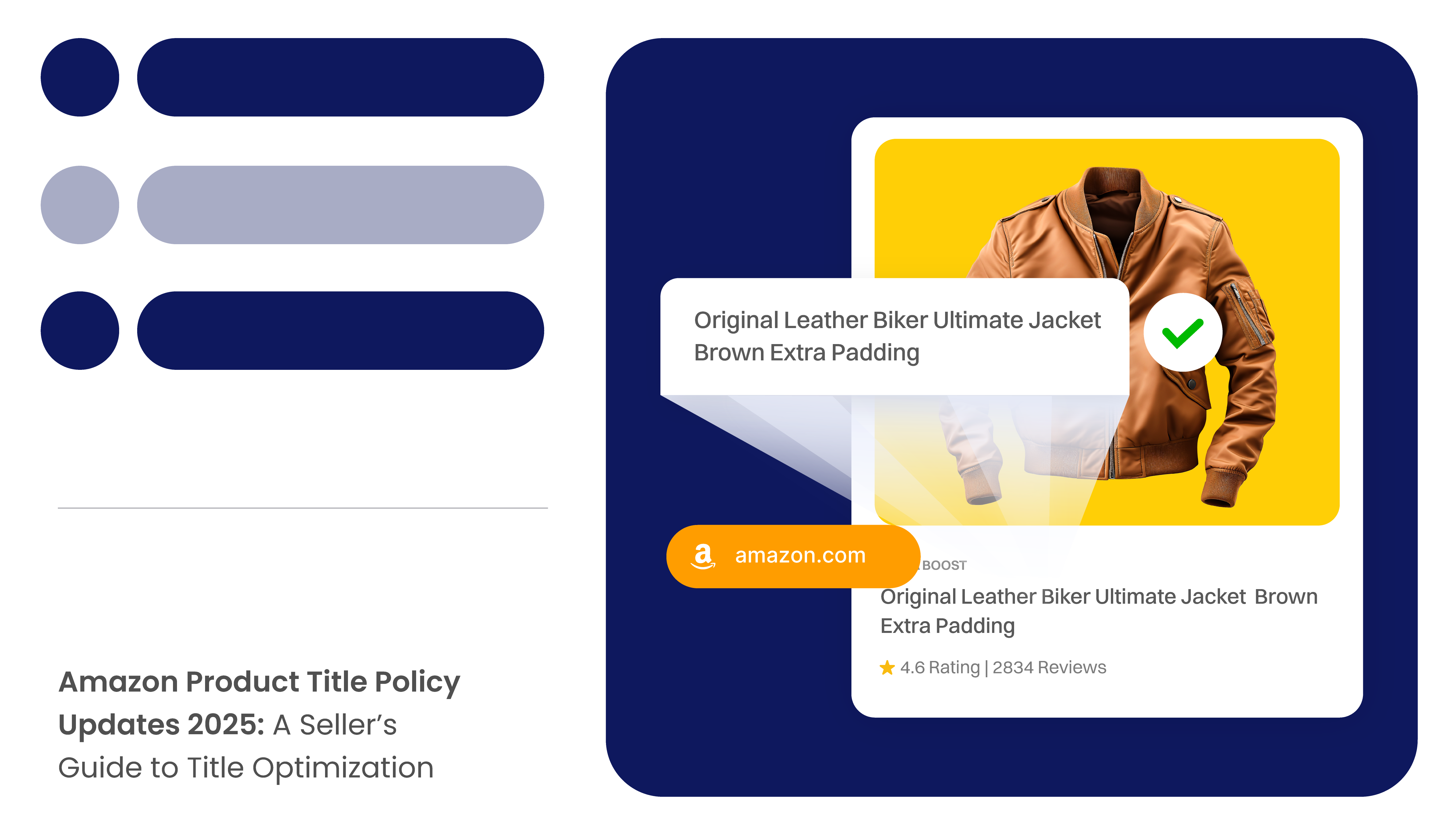You know the drill: Retailers have their content requirements, algorithms reward well-structured product pages, and customers expect consistency no matter where they shop. Yet, despite best efforts, product listings still slip out of compliance. Descriptions get truncated, images don’t meet platform guidelines, and critical attributes go missing.
For brand managers, content compliance isn’t a new concept—it’s an ongoing challenge. With multiple retailers, ever-changing requirements, and the constant risk of misinformation, keeping content in check feels like a never-ending battle. And when listings fall out of alignment, the impact is real: lower search rankings, missed sales, and a fractured brand reputation.
So, how can you stay ahead? In this guide, we’ll discuss the key aspects of content compliance and strategies for ensuring your brand’s product content remains accurate, optimized, and retail-ready.
Let’s get into it.
Content Compliance: Definition and Benefits
Content compliance means ensuring that all your content—from product titles and descriptions to images and customer reviews—follows the rules. These rules include legal requirements (such as truth-in-advertising laws and product safety standards), platform policies (such as Amazon or eBay listing guidelines), and general best practices for honesty and accuracy.
In simpler terms, content compliance is about telling the truth about your products and presenting information correctly. A strong content compliance strategy offers many benefits:
Helps Avoid Legal and Regulatory Risks
Brands can reduce the risk of fines or lawsuits by following laws and regulations. For example, clearly stating product materials and avoiding false claims keep brands in compliance with consumer protection laws. Non-compliance can lead to serious consequences, such as fines or even loss of the right to sell on a platform.
Protects Brand Credibility
Your content is often the first impression of your brand. If customers find inconsistencies or false information, it breaks trust and reputation. On the other hand, compliance marketing content that is accurate and ethical builds a trustworthy brand image. Shoppers are more likely to buy from brands they perceive as honest and reliable.
Improves Customer Experience and Sales
The consumer purchase journey is rarely a straight line. Some shoppers make instant purchases, while others research products across multiple channels—reading reviews, comparing prices, and checking details on different platforms—before deciding.
Inconsistent or incomplete product information can create doubts, leading potential buyers to abandon their purchase or choose a competitor instead.
When product pages are complete and correct, customers can make informed decisions. They know exactly what they’re getting, which means fewer returns and complaints. Updated, compliant content also boosts conversion rates.
For instance, marketplace algorithms like Amazon’s A10 search engine favor content-compliant listings, ranking them higher in search results. This increases their visibility and leads to more sales.
Helps Gain Competitive Advantage
A brand that consistently offers clear, compliant, and high-quality product content will attract high-intent shoppers. It shows that you care about your customers and are committed to transparency. This leads to greater customer loyalty and repeat business.
In short, content compliance matters because it keeps your business on the right side of the law enhances your brand’s reputation, and directly impacts your bottom line. It’s a cornerstone of how you present your products online and how customers perceive your brand.
READ MORE | Struggling to Optimize Your PDPs? Check out E-Commerce Product Page Optimization: Tips and Examples
Elements of a Content-Compliant Product Detail Page

Every element of a product detail page needs to meet content compliance standards. This means providing complete, accurate information and following any guidelines for that element. Let’s break down the key components of a PDP and how to keep each one compliant and effective:

Product Title
The product title is usually the first thing a shopper sees. A content-compliant title is clear, concise, and follows the platform’s rules. Brands need to
- Include Key Information: Mention the brand, product name, and essential details like model or size. For example, “Acme Stainless Steel Travel Mug, 16 oz – Blue” is informative and precise.
- Avoid Misleading Terms: Do not use exaggerated or false claims (e.g., “World’s Best Mug”) that you can’t substantiate.
- Follow Format Guidelines: Check each platform’s specific title requirements (like character limits or no ALL CAPS) and format your titles accordingly. This ensures your title will be legible and meets content compliance standards.
- Use Keywords Wisely: Include relevant keywords so customers can find your product, but avoid keyword stuffing. A naturally worded title that matches what people search for will improve discoverability without breaking any rules.
Product Description
The product description gives you space to tell the story and features of the item. While writing product descriptions, brands should keep them compliant and compelling:
- Describe the product’s features, materials, dimensions, and uses. For example, if your product is electronic, mention technical specifications; if it’s clothing, mention fabric and care instructions.
- Explain how the product helps the customer.
- Use keywords related to your product to help with SEO, but keep the writing natural and readable. Compliant content can be SEO-friendly as long as it remains user-focused.
- Many products need extra information. For instance, include warranty info, safety warnings, or age recommendations if applicable. Shipping and return details are also good to mention in the description or a separate section.
- Use short paragraphs or bullet points for easy reading. Many platforms allow bullet lists in descriptions, which can help highlight key features in a compliant way.
Rich Media
High-quality images and videos are essential for e-commerce content compliance. They show the product clearly and reduce uncertainty.
- Provide images from different angles and, if possible, show the product in use. For example, include a front/back shot, a close-up of details, and a lifestyle image of someone using the product.
- The media should represent the actual item. Avoid misleading edits or outdated photos. If the color or design has changed, update the images to match.
- E-commerce platforms have rules for images (e.g., minimum resolution, pure white backgrounds for main images, no watermarks or added text). Follow these requirements to avoid penalties or the removal of your pictures.
- Add a short product video or a 360-degree view. This helps shoppers get a feel for the product as if they were examining it in a store. Rich media, like videos, can increase customer confidence and engagement.
Over half of consumers consider visuals more important than text when shopping. Great images and videos not only attract buyers but also directly influence purchase decisions.
Ratings & Reviews
Customer ratings and reviews are user-generated content, but they are a key part of your PDP and content strategy. Brands should encourage genuine reviews to improve trust and transparency.
Many shoppers read multiple reviews before buying – in fact, more than half of online shoppers read at least four reviews before making a decision. Therefore, you need to display your product’s ratings and reviews openly. Even if some reviews are critical, showing them provides a complete picture of customer sentiment and is part of being compliant.
Product Availability
When customers like a product and find its performance promising through reviews, they check its availability status. Brands that showcase details about whether products are in stock or limited in stock entice consumers to move to the checkout page.
Moreover, if you show messages like “Only three left in stock” or “X people are viewing this now,” ensure those are truthful and not just a trick. When done right, showing limited availability can encourage buyers to act quickly.

Best Practices for Maintaining Content Compliance
Achieving content compliance is an ongoing process. Here are some best practices to help digital sellers maintain high standards:
Conduct Regular Content Monitoring and Audits
Brands must review their PDPs regularly to ensure consistent compliance. You can schedule audits (e.g., monthly or quarterly) to check that all information is still accurate and compliant. In this process, you need to identify outdated data, typos, or any changes in platform policies that might require edits.
In addition, if a product is updated or new features are added, the content should be updated immediately to ensure nothing is overlooked.
Stay Updated on Guidelines and Regulatory Changes
E-commerce platforms often update their content rules. For example, Amazon’s product title policy has new updates, such as keeping the character limit up to 200 characters and capitalizing every first letter to make your title look professional.
Therefore, you need to keep an eye on seller updates and industry news so you can adapt and ensure that your content adheres to the latest guidelines and updates.
Use Content Compliance Monitoring Tools
Manually tracking hundreds of product pages can be challenging. Fortunately, there are tools for content compliance monitoring. These tools can scan your listings for missing information, policy violations, or inconsistencies.
For instance, content compliance and optimization platforms like MetricsCart automatically monitor your product content in real time. They can alert you immediately if a product detail page falls out of compliance and give a content score to ensure that it matches the requirements of the platform.
Optimize Content for Accessibility and Inclusivity
Making e-commerce content accessible and inclusive benefits a wider range of customers, including those with disabilities or language barriers. This improves user experience, complies with accessibility regulations, and increases customer trust.
One of the most effective ways to enhance accessibility is by adding alt-text to product images for visually impaired users to improve accessibility.
In addition, product descriptions must be easy to read and free of jargon, improving customer understanding. Brands can also provide translations for international markets while ensuring compliance with regional laws and language nuances.
Conclusion
Content compliance isn’t just a box to check—it’s a key part of running a successful e-commerce business. When your product listings are clear, honest, and up-to-date, customers trust your brand more, and platforms reward you with better visibility.
The good news? Staying compliant doesn’t have to be a hassle. With the right strategy, regular audits, and tools like MetricsCart, you can keep your product content in top shape without spending hours on manual updates. Focus on accuracy and following the rules, and you’ll not only avoid problems but also set your brand up for long-term success.
Protect Your Brand & Boost Conversions with MetricsCart.
FAQs
There are specialized tools and software that assist with content compliance monitoring and optimization. These include digital shelf analytics platforms, content management systems, and auditing tools. For example, MetricsCart is a platform that helps brands monitor their product pages across multiple retailers.
Brands should regularly audit their product detail pages. A good rule of thumb is to conduct a thorough audit at least every few months.
If a Product Detail Page is non-compliant, the marketplace might take action: your listing could be suppressed or even taken down until you fix the issues. Second, you could face legal trouble if non-compliance involves breaking the law (for instance, false claims in a product description could lead to fines).
Content compliance can positively affect your SEO rankings. Search engines and marketplace algorithms favor content that is complete, relevant, and regularly updated. If your product pages have all the required information and stay up-to-date, they are more likely to rank higher in search results.
E-commerce brands need to follow several vital regulations to keep their content compliant. Key areas include advertising laws, copyright and trademark rules, product-specific regulations, and consumer data privacy laws.
Additionally, e-commerce marketplaces impose platform-specific rules – for instance, Amazon has detailed listing content policies that sellers must obey. Always check the requirements of each country and platform you operate in.







